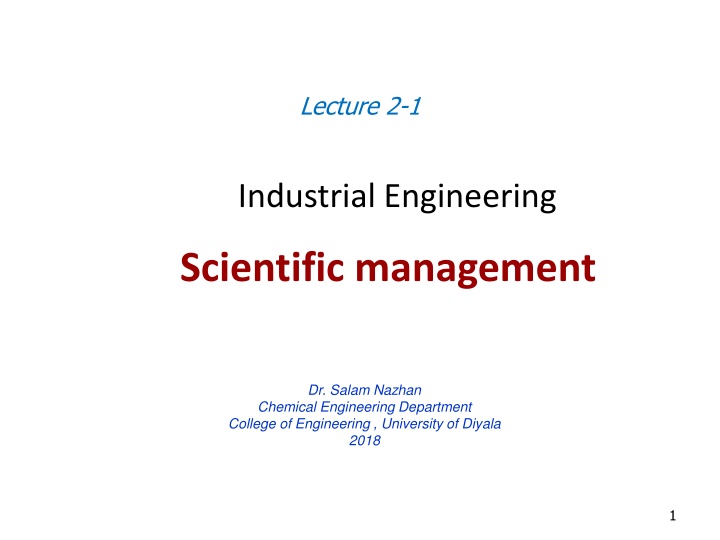
Scientific Management Principles in Industrial Engineering
Explore the characteristics, principles, techniques, advantages, and disadvantages of scientific management as developed by Frederick Winslow Taylor in the early 20th century. Discover how this approach revolutionized modern business practices, emphasizing efficiency and systematic methods over traditional approaches.
Uploaded on | 4 Views
Download Presentation

Please find below an Image/Link to download the presentation.
The content on the website is provided AS IS for your information and personal use only. It may not be sold, licensed, or shared on other websites without obtaining consent from the author. If you encounter any issues during the download, it is possible that the publisher has removed the file from their server.
You are allowed to download the files provided on this website for personal or commercial use, subject to the condition that they are used lawfully. All files are the property of their respective owners.
The content on the website is provided AS IS for your information and personal use only. It may not be sold, licensed, or shared on other websites without obtaining consent from the author.
E N D
Presentation Transcript
Lecture 2-1 Industrial Engineering Scientific management Dr. Salam Nazhan Chemical Engineering Department College of Engineering , University of Diyala 2018 1
Outline Characteristics of scientific management Principles of scientific management Techniques of Scientific Management Advantages of scientific management Disadvantages of scientific management 2
Scientific management During the early 20th century, Frederick Winslow Taylor developed a number of management and organizational theories that led to significant breakthroughs in business practices. Since that era, levels of industrial manufacturing have grown exponentially throughout much of the world. Taylor s ideas have dramatically shaped modern methods of mass production and structural organization. Scientific management is the substitution of the exist scientific investigations and knowledge for the old individual judgment or option in all matters relating to the work done in the shop . Taylor Old methods should be replaced with the scientific method. 3
Characteristics of scientific management 1- It is a systematic approach to handle management problems 2- It implies scientific techniques in method of work, recruitment, selection and training of workers. 3- It rejects the age old method of rule of thumb or hit or miss approach 4- It attempts to discover the best method of doing a work at the lowest cost. 5- It attempts to develop each worker to his greatest efficiency. 6- It involves a complete change in the mental attitude of the workers as well as of the management. 4
Purpose of scientific methods [A] To determine the standard time required to do a job [B] To determine a fair days work for the workers. [C] To determine the best way of doing the work. [D] To select the standard tools and equipment, maintain standard working conditions. 5
Principles of scientific management 1- Science, not rule of thumb [Development and application of scientific methods.] 2- Harmony, not discord (conflict) [harmony between management and labour] 3- Cooperation, not individualism [cooperation between management and workers] 4- Development of workers [development of each worker to his greatest efficiency] 5- Maximum, not restricted output [maximum output in place of restricted output] 6- Equal division of responsibility between management and labour. 6
Techniques of Scientific Management Work study includes the following techniques:- Method study: This study is conducted to know the best method of doing a particular job. It helps in reducing the distance travelled by materials, and brings improvements in handling, transporting, inspection, and storage of raw materials and goods. [1] Standardization and simplification of work [work study] Purpose of motion study is: i- To find and eliminate wasteful motions among the workers ii- To find the best method of doing various operations iii- It helps to increase the efficiency of workers iv- It results in higher production and productivity Motion Study 7
References Introduction to Industrial Engineering, by Z. Max Shen Industrial Engineering, by N. J. Manck Industrial Management, by Shiv Jhalani Reference Books: 1. Management by Knootz. 2. Management by Griffin. 3. Management theory and Practices by JS Chandan.
